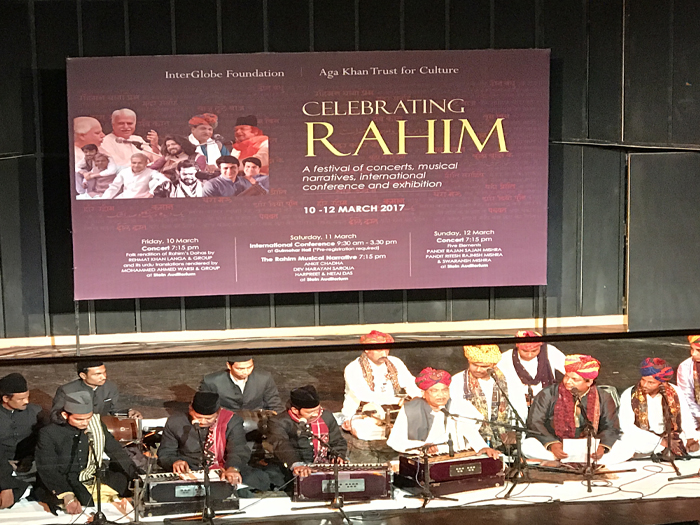3 Day Festival of Rahim
A three day festival showcasing the life, works and music of Abdur Rahim Khan - i - Khanan was organised by the InterGlobe Foundation and the Aga Khan Trust for Culture between 10 and 13 March, 2017 at the India Habitat Centre. Ms Sunita Singh, Ms. Sangita Verma and Ms. Charu Bhatnagar Singh represented our School at the event, which was inaugurated by Mr. M. J. Akbar, Honble Minister of State for Foreign Affairs, Government of India.
Khanzada Mirza Khan Abdur Rahim Khan-i-Khanan was one of Akbars 'gems' and a minister in his court. Rahims father, Bairam Khan was instrumental in promptly getting Akbar proclaimed as the heir of the Mughal dynasty after the untimely death of Humayun! He also led the Mughal army to challenge the Hindu chieftain, Hemu ,who had seized Delhi and in the Second Battle of Panipat, the imperial army defeated Hemu.
Once Akbar came of age, he pensioned off Bairam who left for Mecca. However his court rivals pursued and murdered him. Thereon Akbar brought Rahim to his court and became his guardian.

Abdur Rahim Khan-i- Khanan stands out in Mughal history as an outstanding general and courtier. His most cited achievements are his military victories in Gujarat, the conquest of the Sindh and his long tenure as Viceroy in the Deccan seeking to expand the Mughal empire further south. In the court, he was the greatest of the Mughal patrons of Persian poetry.
However, this list of achievements is outmatched by his even larger image as a leading Bhakti poet alongside Tulsidas and Kabir. Rahims dohas are straightforward lessons for everyday life, touching upon themes of friendship, animosity, the crests and troughs of life, family, relationships etc.
Day One of the festival, ie., 10th March, began with a folk rendition of some of Rahim's dohas by Rehmat Khan Langa and his Group. Their Urdu translations were rendered by Mohammed Ahmed Warsi.
Ustad Rehmat Khan Langa belongs to a famous traditional family of folk artists-The Langas of Jodhpur. Starting his music career very early in life, he has performed both at national and international events for more than 40 years. He is also associated with the All India Radio and National Bal Bhawan.
Mohammad Ahmed Warsi Nasiri from Rampur, is acclaimed as a leading khanaqahi qawwal in the country, today. His grandfather Ustad Abduallah Khan sahib and his brothers were employed in the Rampur court under the patronage of Nawab Hamid Ali Khan.
The second day, 11th March, was devoted to Dastagoi. The life of Rahim was interwoven with music to form a first-ever musical narrative of the life of Rahim. It was narrated by Ankit Chadha and the music was by Dev Narayan Sarola, Harpreet and Netai Das. The resource of the music interspersed with narrative was taken from musicians of Benaras, Vrindavan, Burhanpur, Bhadoi etc.
The final day on 12th March was titled Five Elements where Pandit Rajan- Sajan Mishra, Pandit Ritesh Rajnish Mishra and Swaransh Mishra brought to life the timeless wisdom of Rahim with a presentation of his dohas in a classical rendition. This acclaimed family of musicians are the foremost exponents of the Benaras Gharana. Their compositions reflect a high regard of literary content and observe the purity of the raga, which brings out their subtlest intended emotions and carries an instant appeal for the audience.
In the end one could just say that the diversity of the performances from qawali to dastongoi brought out every rich flavour of Rahims own life as a courtier, a general and a poet of ethics, morality and devotion. Rahims celebration and revival was definitely both serendipitous and marvellous.
Ms. Charu Bhatnagar Singh.













